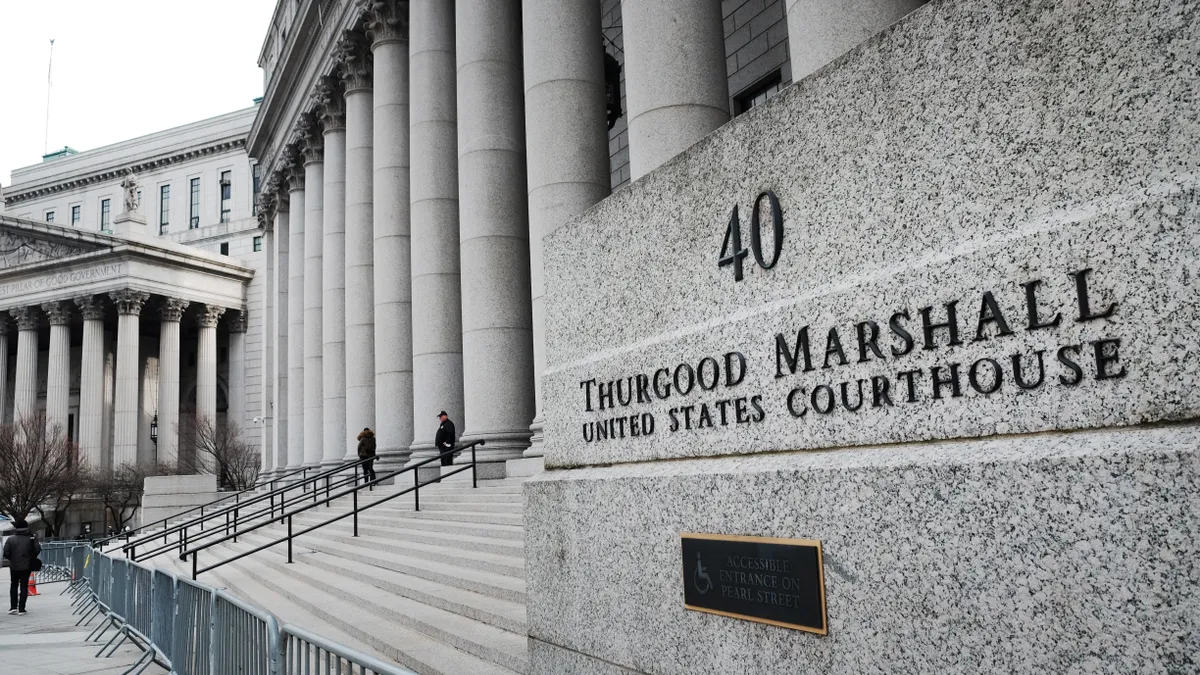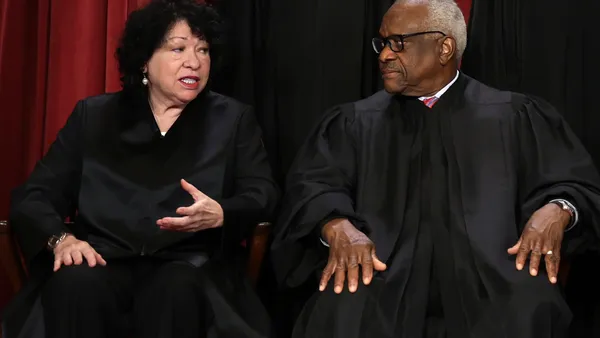Dive Brief:
- A Muslim corrections officer can sue her employer, the New York Department of Corrections and Community Supervision, or DOCCS, for allegedly violating Title VII of the Civil Rights Act of 1964 over the way it allegedly handled a security inspection of her hijab, the 2nd U.S. Circuit Court of Appeals held Feb. 6.
- The Muslim religion requires women to wear a hijab in the presence of men outside their family, according to court documents in Billings v. Murphy. The DOCCS granted the officer’s religious accommodation request to wear a hijab at work, allegedly subject to certain conditions, including that it must be worn in a way to immediately tear away should anyone grab it and that she undergo a safety inspection to ensure this could happen, the U.S. Department of Justice explained in a “friends-of-the-court” brief. A male supervisor conducting the inspection allegedly denied her request to remove the hijab in a front of a female supervisor and demanded she do so in front of him. She complied, but suffered an anxiety attack because of the interaction and said she wasn’t allowed to return to work for several months. After she did, she sued the DOCCS for retaliation and discrimination, allegedly in violation of Title VII.
- A federal district court dismissed the suit. It reasoned that the officer failed to state a cause of action for discrimination because she didn’t allege she suffered an adverse action. The 2nd Circuit disagreed and reinstated the claim. The “refusal to accommodate Billings’s request to remove her hijab in front of a female supervisor constitutes an adverse employment action because it is a ‘materially adverse change in the terms and conditions of employment’ that is ‘more disruptive than a mere inconvenience or an alteration of job responsibilities,’” the 2nd Circuit explained. Given that the DOCCS did not contend the request was unreasonable or created an undue burden, the panel vacated the lower court’s ruling.
Dive Insight:
Title VII prohibits employers from discriminating against an employee or applicant because of their religion, the U.S. Equal Employment Opportunity Commission compliance manual reminds stakeholders. To avoid violating Title VII, employers may have to provide a religious accommodation (a change to the way things are normally done at work) so an employee can practice or observe their religion, the EEOC explains in a guidance.
Employers can be excused from this obligation if providing a religious accommodation would create an undue hardship on their business. The burden has always been on the employer to show this. But what’s key now is the U.S. Supreme Court’s recent shift toward employee-favorable rulings in religious accommodation cases.
Last year, for example, the justices unanimously threw out a long-used lenient standard for proving undue hardship in these cases and ruled that employers are subject to a much higher bar. As a result, to show a religious accommodation would cause undue hardship, an employer must demonstrate the burden of the requested accommodation “is substantial in the overall context of [its] business,” taking into account the employer’s nature, size and operating costs.
The standout takeaway here is to make sure managers know how to properly respond to religious accommodation requests. A request should not be automatically refused, and employers should stay away from rigid policies that don’t allow for exceptions, the EEOC guidance cautions.
Managers should also be receptive to additional accommodation requests, the guidance adds. That was allegedly one of the issues in the case, the 2nd Circuit pointed out. “Billings timely rejected the condition that she remove her hijab in front of a male, explained the conflict with her religious practice, and requested a female supervisor, which can be construed as either a request for a modification to the original accommodation or a separate accommodation request,” the panel explained.
Many managers are ill-equipped to handle employee complaints, a 2019 study by pelotonRPM found; training them is important because employees often go to managers first, not HR, to report issues such as harassment.
An example of what can happen without proper training involved a former Muslim teenager who worked for a Chipotle restaurant in Kansas, according to a recent EEOC lawsuit. Her supervisor repeatedly asked her to remove her hijab, saying he wanted to see her hair, the EEOC alleged. She complained to the shift manager, who witnessed the conduct but allegedly failed to report it to management, court records said. The supervisor eventually pulled the hijab from the worker’s head, and she resigned the next day, the lawsuit alleged.











